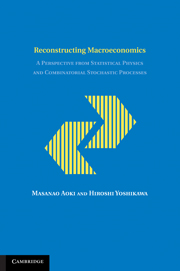 Reconstructing Macroeconomics
Reconstructing Macroeconomics Book contents
- Frontmatter
- Contents
- Preface by Masanao Aoki
- Preface by Hiroshi Yoshikawa
- 1 Introduction: A New Approach to Macroeconomics
- 2 The Methods: Jump Markov Process and Random Partitions
- 3 Equilibrium as Distribution: The Role of Demand in Macroeconomics
- 4 Uncertainty Trap: Policy Ineffectiveness and Long Stagnation of the Macroeconomy
- 5 Slow Dynamics of Macro System: No Mystery of Inflexible Prices
- 6 Business Cycles: An Endogenous Stochastic Approach
- 7 Labor Market: A New Look at the Natural Unemployment and Okun's Law
- 8 Demand Saturation-Creation and Economic Growth
- 9 The Types of Investors and Volatility in Financial Markets: Analyzing Clusters of Heterogeneous Agents
- 10 Stock Prices and the Real Economy: Power-Law versus Exponential Distributions
- References
- Author Index
- Subject Index
- Other books in the series (continued from page iii)
3 - Equilibrium as Distribution: The Role of Demand in Macroeconomics
Published online by Cambridge University Press: 08 August 2009
- Frontmatter
- Contents
- Preface by Masanao Aoki
- Preface by Hiroshi Yoshikawa
- 1 Introduction: A New Approach to Macroeconomics
- 2 The Methods: Jump Markov Process and Random Partitions
- 3 Equilibrium as Distribution: The Role of Demand in Macroeconomics
- 4 Uncertainty Trap: Policy Ineffectiveness and Long Stagnation of the Macroeconomy
- 5 Slow Dynamics of Macro System: No Mystery of Inflexible Prices
- 6 Business Cycles: An Endogenous Stochastic Approach
- 7 Labor Market: A New Look at the Natural Unemployment and Okun's Law
- 8 Demand Saturation-Creation and Economic Growth
- 9 The Types of Investors and Volatility in Financial Markets: Analyzing Clusters of Heterogeneous Agents
- 10 Stock Prices and the Real Economy: Power-Law versus Exponential Distributions
- References
- Author Index
- Subject Index
- Other books in the series (continued from page iii)
Summary
We begin this chapter by reconsidering the notion of equilibrium in economics. In the standard analysis, optimization by an economic agent is followed by supply and demand; every economic agent or unit is always in his/her best position. The equality of demand and supply in the market then constitutes equilibrium. In the equilibrium, marginal utilities and productivities are equated to prices, and as a consequence, they are all equal. Lucas (1987) describes this equilibrium theory as the economic theory. In this framework, demand does not matter for the determination of the level of aggregate economic activity. It is determined by technology and factor endowments.
In the economy, micro units or economic agents certainly optimize. Some economists stress the limits of rationality of economic agents, and advocate “bounded rationality.” However, in our view, the problem surrounding bounded rationality is irrelevant to macroeconomics. More fundamental are micro fluctuations, uncertainty, and the limits to arbitrage in real economic activities.
In standard economic theory, which ignores microeconomic fluctuations, the outcome of optimization by an economic agent is given by a “point” in some set or space; typically, a point is supported by a price vector. In this chapter, we explain that this approach is not valid because of microeconomic fluctuations.
Given the complexity of the macroeconomy, we must explicitly consider stochastic deviations of microeconomic behavior from its mean. In Chapter 1, we have seen that micro behaviors of individual households and firms are very diverse.
Information
- Type
- Chapter
- Information
- Reconstructing MacroeconomicsA Perspective from Statistical Physics and Combinatorial Stochastic Processes, pp. 58 - 88Publisher: Cambridge University PressPrint publication year: 2006